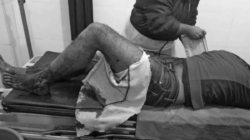For years, Tul Bahadur BK toiled under the harsh conditions of the Gulf to provide for his family in Nepal. But one phone call changed everything. It was his son, Sahil, a Grade 11 student at the time, urging his father to return home. “You’ve worked enough in the Gulf, Father. It’s my turn to take care of the family now,” Sahil said.
Tul Bahadur saw a glimmer of hope and planned his return. However, fate had other plans.
In January 2014, Sahil accepted a job as a driver and salesman with Saudi Arabia’s National Agricultural Development Company (NADEC). The company covered all his expenses, including airfare, visa, health checks, and recruitment fees. Sahil began earning 1,200 riyals—200 more than his father’s salary after 15 years in the Gulf.
With Sahil’s stable income, the family’s financial burdens eased. He sent Rs70,000–80,000 home monthly, enabling them to build a house, marry off his sister, and even take a loan of Rs900,000. Confident in his son’s ability to provide, Tul Bahadur returned to his village in Tanahun, Nepal.
But in October 2019, everything changed. Sahil stopped contacting his family. Concerned, Tul Bahadur reached out to Sahil’s colleague, Bhakta Narayan Shrestha, who eventually delivered devastating news: “Sahil has been arrested. He killed his boss.”
The revelation sent shockwaves through the family. Tul Bahadur’s wife, Parvati, fainted, and he was consumed by fear. He understood the severity of Saudi Arabia’s Sharia law, where murder often results in a death sentence.
Months later, in January 2020, Sahil called home from prison. “I didn’t mean to kill. It happened because of a cybercrime,” he told his father. Sahil explained that his manager, Abdul Ayaz, an Indian national, had allegedly posted inappropriate pictures and videos of him on Facebook. A confrontation escalated into a violent altercation, and in a moment of rage, Sahil stabbed Ayaz, who later succumbed to his injuries.
Sahil immediately turned himself in, confessing to the police. Witnesses, including coworkers, confirmed his involvement.
The victim’s family in Hyderabad, India, was consulted about accepting blood money—a provision under Islamic law to pardon the accused in exchange for financial compensation. However, Ayaz’s wife, Jabina Begum, rejected the offer.
In November 2021, a Saudi lower court sentenced Sahil to death, a decision upheld by the Appeal Court in February 2022 and the Supreme Court in April 2023. Despite diplomatic efforts by Nepal’s Consulate General in Jeddah and appeals to the Nepali Embassy in Delhi, Ayaz’s family remained firm in their refusal to grant a pardon.
Sahil’s parents have spent years grappling with the tragedy. Tul Bahadur, now 51, was forced to return to foreign employment in the Maldives to support his family. Parvati, on the other hand, has been tirelessly seeking help from politicians and government officials to save her son.
“Many others in similar situations have been pardoned after paying blood money,” Tul Bahadur lamented. “We wanted to meet the victim’s family in India, but we couldn’t arrange it. It’s been six years, and my son is still in prison. He could have stayed there for life, but this death sentence is unbearable.”
Sahil has been transferred from Taif prison to Jeddah, according to Foreign Ministry spokesperson Krishna Prasad Dhakal. “Diplomatic efforts are ongoing,” Dhakal said. “But the victim’s family remains unwilling to pardon him.”
For Tul Bahadur and Parvati, hope is dwindling. “I haven’t heard from my son in three months,” Parvati said. “He’s only 26. Even if he stayed in prison for life, it would be better than this.”
The family now clings to a sliver of hope that diplomatic efforts may save Sahil’s life. Until then, they endure an agonizing wait for answers that may never come.




